高三英语高一上学期复习unit-1-2
- 格式:ppt
- 大小:212.00 KB
- 文档页数:10
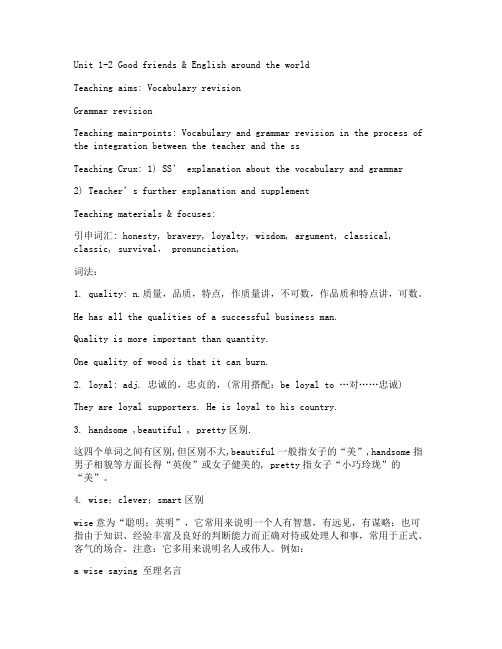
Unit 1-2 Good friends & English around the worldTeaching aims: Vocabulary revisionGrammar revisionTeaching main-points: Vocabulary and grammar revision in the process of the integration between the teacher and the ssTeaching Crux: 1) SS’ explanation ab out the vocabulary and grammar2) Teacher’s further explanation and supplementTeaching materials & focuses:引申词汇: honesty, bravery, loyalty, wisdom, argument, classical, classic, survival, pronunciation,词法:1. quality: n.质量,品质,特点, 作质量讲,不可数,作品质和特点讲,可数。
He has all the qualities of a successful business man.Quality is more important than quantity.One quality of wood is that it can burn.2. loyal: adj. 忠诚的,忠贞的,(常用搭配:be loyal to …对……忠诚)They are loyal supporters. He is loyal to his country.3. handsome ,beautiful , pretty区别.这四个单词之间有区别,但区别不大,beautiful一般指女子的“美”,handsome指男子相貌等方面长得“英俊”或女子健美的, pretty指女子“小巧玲珑”的“美”。

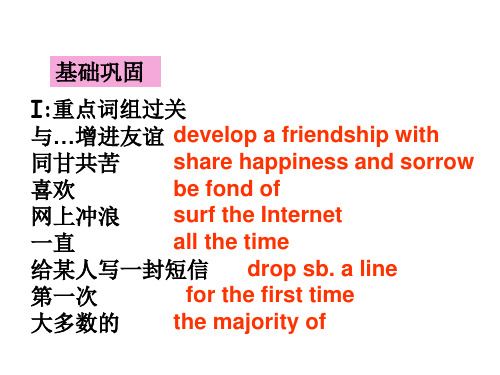
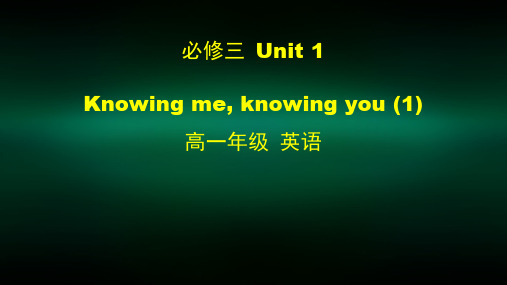
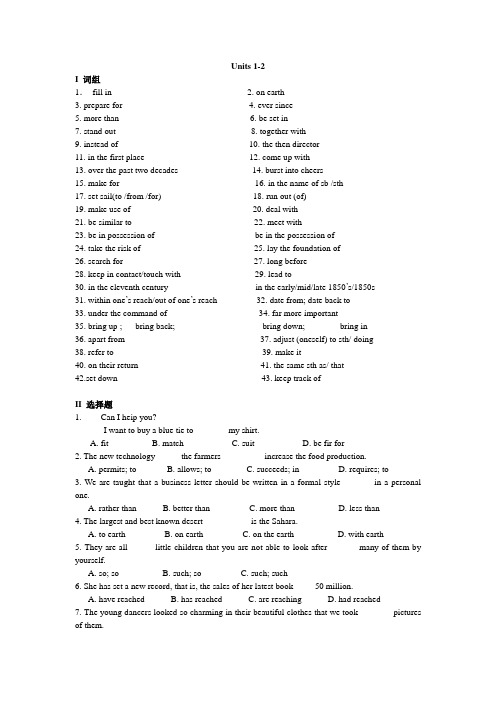
Units 1-2I 词组1.fill in 2. on earth3. prepare for4. ever since5. more than6. be set in7. stand out 8. together with9. instead of 10. the then director11. in the first place 12. come up with13. over the past two decades 14. burst into cheers15. make for 16. in the name of sb /sth17. set sail(to /from /for) 18. run out (of)19. make use of 20. deal with21. be similar to 22. meet with23. be in possession of be in the possession of24. take the risk of 25. lay the foundation of26. search for 27. long before28. keep in contact/touch with 29. lead to30. in the eleventh century in the early/mid/late 1850’s/1850s31. within one’s reach/out of one’s reach 32. date from; date back to33. under the command of 34. far more important35. bring up ; bring back; bring down; bring in36. apart from 37. adjust (oneself) to sth/ doing38. refer to 39. make it40. on their return 41. the same sth as/ that42.set down 43. keep track ofII 选择题1.--- Can I heip you?---- I want to buy a blue tie to _______ my shirt.A. fitB. matchC. suitD. be fir for2. The new technology _____ the farmers _________ increase the food production.A. permits; toB. allows; toC. succeeds; inD. requires; to3. We are taught that a business letter should be written in a formal style _______in a personal one.A. rather thanB. better thanC. more thanD. less than4. The largest and best known desert __________ is the Sahara.A. to earthB. on earthC. on the earthD. with earth5. They are all _____ little children that you are not able to look after ______ many of them by yourself.A. so; soB. such; soC. such; such6. She has set a new record, that is, the sales of her latest book ____ 50 million.A. have reachedB. has reachedC. are reachingD. had reached7. The young dancers looked so charming in their beautiful clothes that we took _______ pictures of them.A. many ofB. masses ofC. the number ofD. a large amount of8. The speech by the mayor of Shanghai before the final voting for EXPO 2010 strongly impressed ______ my memory.A. toB. overC. byD. on9. _____, I have never seen anyone who’s as capable as John.A. As long as I have travelledB. Now that I have travelled so muchC. Much as I have travelledD. As I have travelled so much10. In some parts of London, missing a bus means ________ for another hour.A. waitingB. to waitC. waitD. to be waiting11. A modern city has been set up in ______ was a wasteland ten years ago.A. whatB. whichC. thatD. where12. _______ I can see, there is only one possible way to keep away from the danger.A. As long asB. As far asC. Just asD. Even if13. They had a pleasant chat ______ a cup of coffee.A. forB. withC. duringD. over.14. Generally speaking, _____ according to the directions, the drug has no side effect.A. when takingB. when takenC. when to takeD. when to be taken15. Most animals have little connection with _______ animals of _______ different kind unless they hunt them for food.A. the; aB. /; aC. the; theD. /; the16. It is said in Australia there is more land than the government knows _________.A. it what to do withB. what to do it withC. what to do with itD. to do what with it17. I got the story from Tom and ______ people who had worked with him.A. every otherB. many othersC. some otherD. other than18. As far as I am concerned, education is about learning and the more you learn, __________.A. the more for life are you equippedB. the more equipped for life you areC. the more life you are equipped forD. you are equipped the more for life19. It _____ long before we _______ the result of the experiment.A. will not be; will knowB. is; will knowC. will not be; knowD. is; know20. It is not rare in ______ that people in _____ fifties are going to university for further educatuion.A. 90s; theB. the 90s; /C. 90s; theirD. the 90s; their21. The fire spread through the hotel very quickly but everyone ______ get out.A. had toB. wouldC. was able toD. could22. It was foolish of him to ______ his notes during that important test, and as a result, he got punished.A. stick toB. refer toC. keep toD. point to23. ---When shall we start?--- Let’s ______ it 8:30. Is that all right?A. setB. makeC. meetD. takeUnit 1concludevt. 1. 结束[(+by/with)]We concluded our meeting at 9 o’clock.我们九点钟结束了会议。
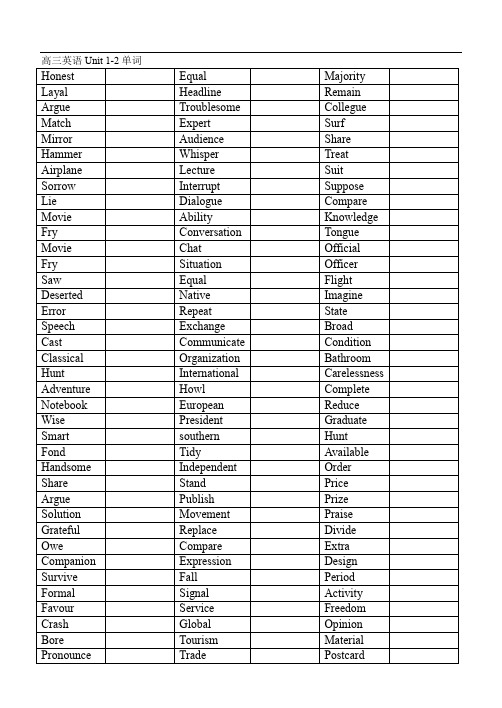
高一英语上册Unit;1;-;2单元专题复习教案高一英语上册unit 1 - 2单元专题复习教案unit 1 - 2study aim: grasp the following words and sentence structure and remember how to use them.study guide: read the new words and fill in the blanks in about 20 minutes.study test: finish the exercise given.☆重点句型☆1. chuck is on a flight when suddenly his plane crashes. “when"作并列连词的用法2. what / who / when / where is it that...? 强调句的特别疑问句构造3. with so many people communicating in english everyday, ... “with+宾语+宾补”的构造做状语4. can you tell me how to pronounce...? 带连接副词(或代词)的不定式做宾补的用法5. have difficulty in doing sth.重点及难点:1. when conj. = and then,表示“就在那时,突然”,常见以下句型中:(1) be doing...when...正在做……突然……i was wandering through the streets when l caught sight of a tailor's shop.(2) had done...when...刚做了……突然……i had just sat down when the light went out.(3) be about to do...when...刚要做……突然……i was just about to go swimming when our guide saw me and shouted at me.2. while conj.(1) while附属连词,引导时间状语从句,从句动词用持续性动词,主句的动作发生在从句动作发生的过程之中。
高一英语复习Unit 1-2人教版【本讲教育信息】一.教课内容复习 Unit 1-2二.教课目的复习 Unit 1-2三.教课重难点掌握课文中的要点句型的构造、用法Review of Unit1&2wise adj.理智的wisdom n.理智argue v.争辩argue with sb. about/over sth.argue sb. into/out doingsolution n.解决the solution tomatch n.火柴,竞赛 v.相当survive v.幸免,幸存survivor n.幸存者survival n.幸存deserted adj.荒弃的,被遗弃的desert n.荒漠 v.扔掉,遗弃in order to与so as to二者都是指“为了” ,只可是 so as to不可以用于句首care about与care forcare about译为“在意,关怀” ,care for则译为“喜爱,照料”如: He doesn’t care much about his money.Would you care for tea or coffee?Would you care for my dog when I am away?such as 与 for examplesuch as 是介词词组,后边要加名词,而for example相当于副词词组如: He can speak several foreign languages, such as English, Germanand French.He can speak several foreign languages, for example, English, Germanand French.broad adj.广阔的repeat vt.重复repeat doingmajority n.大部分a / the majority ofmajor adj.主要的minority n.少量的a / the minority ofminor adj.次要的equal adj.等同的,胜任的situation ,condition与casein this situationin this casein case that / ofon condition thatin good / bad conditionunder good / bad conditionexcept ,except for与besidesexcept 是“除了”,是介如: All the students except him went there.except for也是“除了”,但它更前一句的充明如: Your homework is very good except for some minor mistakes.besides 是“除了⋯有⋯”如: All the other students went there besides him.exchange v.交,交流exchange sth. with sb.exchange sth. for sth.come aboutcome acrosscompare v.比,比compare sth. with sth.compare sth. to sth.compared to / withreplace vt.替,代替replace sth. with sth.(二)文重点I don ’t enjoy singing, nor do I like computers.nor 和 neither的用法,表示“也不”用倒装⋯when suddenly the plane crashes.crash 表示“触犯”,crash to the groundcrash into sth.crash的名表示“ ,空”等如air crash, car crash等⋯hunt for food, and make fire.hunt for表示“ 取,找”与look for,search for近似,但hunt for更目的性,也就是很努力地找,在合成job-hunting里面体的很明。
Senior Book I Unit 1– Unit 2Email: syzxcyp@I .Wordsa) Write the correct forms of the following words:1.honest→honestly adv. →honesty n.2.brave →bravely adv. →bravery n.3.argue → argument n. →argumentative adj.4.adventure→adventurous adj.→adventurously adv.5.classical→classic n.古典作品→classically adv.6.pronounce→pronunciation n.municate→communication n. 8.express→expression n. pare→comparison n.anize→organization n. 11.European→Europe n. 12.south→southern adj. 13.independence→independent adj. ernment→govern v.b) Fill in the blank with the suitable words listed above.1. The police communicate with each other by radio nowadays.2. His English pronunciation is not good, but it is improving.3. No student in this school is from the southern part of Taiwan.4. Her husband is an_ honest man.5. Germany is an European country.6. They held out bravely against repeated enemy bombing.7. You should learn to be independent of your parents.8. The explorer told the boys about his adventure in the ArcticII. Words and phrasesTranslate the following phrases ,from Chinese to English or form English to Chinese.1. argue with sb. about sth 与某人辩论某事2.be into 对什么感兴趣;热衷于3. be fond of 喜爱4.all the same 一直5.even though (=even if) 即使6.all the way 一路上e about 发生,产生8.know about 了解9.bring _about__ 引起,导致10.stay __up_ 熬夜11.more_or____less 或多或少12.take__off_____ 脱下,起飞13.turn __up____ 出现,调高音量14.end _up____with 以…告终15.have a good _knowledge of 通晓.熟知16.as _much/many__ as 多达17__tell__a lie/lies 撒谎18.see sb. _off_为某人送行III .Language points & Sentence patterns1. argue vi.常见搭配有:argue about/over sth. 就某事进行争论argue with sb. about sth. 就某事与某人进行争论argue sb. into doing sth. 说服某人做某事argue sb. out of doing sth. 说服某人不做某事辨析:( D )I don’t want to ________ with you. I just want to __________ that you’re wrong.A. discuss ; quarrelB. quarrel ;discussC. argue ; quarrelD. quarrel ; argue2. too much与much too的区别:too much:(1).做形容词,接不可数名词:不要给他太多的表扬。